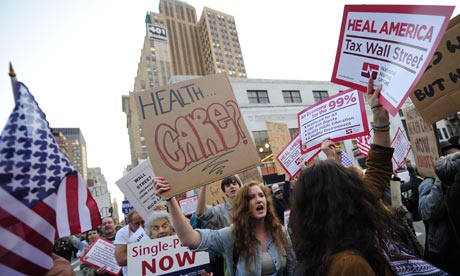As a citizen of India, and as a citizen of the world we all inhabit, I offer one of Gandhi's most basic ideas to those Occupying Wall Street. India is the world's biggest democracy and the US is the world's most powerful democracy. I know the actions of the United States profoundly affect my country's future – but I also know the reverse is true.
The Occupy Wall Street movement was partly inspired by demonstrations in Cairo's Liberation Square – "March like an Egyptian!" was one of its slogans – and the peaceful demonstrators in Wall Street's Zucotti Park ate pizzas ordered on the web by supporters in Libya.
India gained independence without a war, something even the United States can't claim. This was largely due to Gandhi's understanding that the ends don't justify the means, the means are the ends; the means we choose dictate the ends we get. As this has come down to us, it is popularly understood as non-violence, but it went far deeper than that. After all, if actions are only against something, however unjust, the result will not satisfy people's need to see and taste and live and work for something that is just. Even if the negative effort wins, a new negative will replace it because a critical mass of people haven't learned to live in a positive way. Gandhi went so far as to say that civil disobedience is "worse than useless…without …constructive effort."
The Occupy movement has already created a populist awareness that the distance between the one percent who are rich and the 99% is greater than at any time in more than a hundred years. That is a huge accomplishment in a country that assumes people are more equal here than anywhere else in the world, no matter how far down the list of developed nations the US may be by most measures of democracy.
OWM has also tried to create an alternate democratic community within itself, though decision-makers and media spokespeople remain mostly white and male; a fact that has led to a blogger rebellion called "Occupy Patriarchy." But what it has tried much less, are positive and practical actions outside the OWM movement. Gandhi matched each populist call for a negative action with a call for a positive action. It was what he called "constructive programming."
For example, his call for non-violence included a call for a populist effort to help the wounded in the Boer War. His argument for the eradication of "untouchables" – people outside the caste system whom Gandhi renamed Harijan or Children of God – included a call for caste Hindus to clean sewage in Harijan colonies; a reversal of their positions and jobs. His rejection of goods whose raw materials were grown in India, then shipped to British factories and sold back to Indians at a high price, was also a call to support village artisans by buying their goods instead.
Millions of volunteers were given something tangible to do. Rich and poor, women and men, entitled and disenfranchised; all joined in. Coming to know each other and challenging their customary beliefs about each other changed them. Young high-caste men worked in Harijan settlements, housewives spun yarn or threw their foreign made possessions into bonfires, men and women supported wounded soldiers, aristocrats gave up their inherited titles and become known for their personal actions, and factory owners donated funds and personal services to schools and ashrams. These actions changed not just the poor, but also the powerful. For India, constructive programming became a political tool against the British Empire. Helping wounded and traumatized soldiers meant highlighting the brutality of war, serving a Harijan colony meant challenging the hierarchy of caste. They created the daily experience of democracy from the bottom up.
The Occupy protestors have demanded more regulation of the financial industry, arrest of the "financial fraudsters" responsible for the 2008 crash, a Presidential commission to investigate corruption in politics, freeing students from the burden of college debt, limiting the profits by health insurers, and an end to the wars in Iraq and Afghanistan. Those are all fine demands and we have responsibility for them in the way we vote. But they all depend on action at the top. We have the most responsibility where we have the most control – and that means control over our own actions. Every time OWS protests what happens at the top, there could also be a call for constructive action at the bottom.
Here are just two of hundreds of acts that could be opened up as public possibilities.
Vets returning from Iraq and Afghanistan often say they just want to be listened to and know their experience is honored by attention at home. This includes women vets whose trauma from sexual assault within the military is equal to and sometimes greater than the trauma of impersonal violence experienced by male veterans. Creating a populist platform to hear these stories would be healing for many veterans.
Shelters for the homeless are often so dirty and dangerous that the street is preferable. This would be a lot less possible if neighborhoods or corporations or colleges organized their members to clean and monitor a shelter for a few hours each week.
These actions at the bottom may seem small right now. Gandhi's Salt March to the sea when he defied the English salt-making monopoly by leading thousands to collect and make their own salt must have seemed small then. Rosa Parks refusing to change her seat on a bus must have also seemed small at that time.
Positive acts are contagious. They balance the negative protests that are vital, too, they teach us how to live, and they show us what a just government could do.
Gandhi would have led us in Occupying Wall Street, but that would be only half the story. What he called his "experiments with truth" were positive acts in the ordinary spaces of our daily lives.










Comment from the paper
John Harris: Paul McCartney and Bob Dylan? That's the sound of ageing
Tim Montgomerie: David Cameron must make brave steps towards a federal UK
Jackie Ashley: Only fear of losing face keeps this mad NHS gamble going